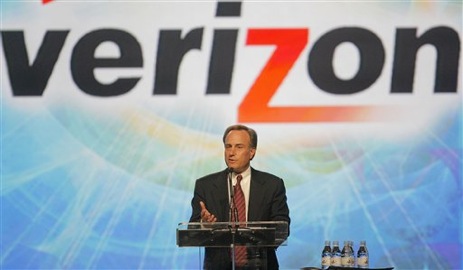The teen-dream romance between T-Mobile and Sprint is moving on from playful banter in the lunchroom to lingering by the lockers between classes, with a top T-Mo USA executive saying that a merger with Sprint would make the most sense. [More]
telecoms

Report: 25% Of Americans Won’t Have A Traditional TV Subscription By 2018
TV viewers have been snipping the cord and freeing themselves from traditional TV subscriptions offered by satellite and cable companies for years, so it may come as no surprise that the flood of customers fleeing to streaming video shows no signs of easing. [More]

T-Mobile Will Provide Customers Unlimited Pokémon Go Data Until Fad Dies, Or August 2017
While the suddenly popular mobile game Pokemon Go doesn’t gobble data in the same way as streaming music or video, it does use more data than just wandering around not hunting for imaginary creatures. That’s why T-Mobile is joining the party and giving Pokémon trainers unlimited data within the app for more than a year as its next promotion for T-Mobile Tuesdays. [More]

After ‘Serial’ Season Is Over, Global Tel-Link Will Keep Charging Inmates Outrageous Phone Fees
The last episode of the current series of hit podcast “Serial” was made available for download this morning. It’s the last time that millions of listeners will hear a brand name that has appeared in every episode but was likely unfamiliar to them. The people over at Global Tel-Link probably aren’t heartbroken that they’re losing the free product placement, though. As a telecommunications company providing phone service for prisoners, consumer name recognition isn’t very important to them. [More]

Court Says It's Fine That Telecommunications Companies Collaborated With Federal Wiretaps
A U.S. appeals court says it’s just fine that certain telecommunications companies cooperated with the National Security Agency by monitoring customers’ email and phones, upholding a 2008 law. This means they’ve got immunity, rendering 33 lawsuits against them ineffective. [More]

Spread 'Em, Wireless Companies — It's Time For An FCC Probe
Back in July, Consumer Reports revealed that the FCC would be taking a long, close look at cell phone companies, and this week it’s finally time for that probe.

The Federal Government Has Had Enough With Cell Phone Exclusivity
Annoyed by cell phone exclusivity deals? The federal government may agree with you. The FCC and Department of Justice are both looking into the issue, concerned about limitations on consumer choice and good old-fashioned competition.

Cox Sees Your Double Payment, Raises You A Double Bill
Tamera accidentally paid her $134.61 Cox Cable bill twice, but instead of refunding or acknowledging the overpayment, Cox thought it would be fun to send Tamera an extra bill for $269. If she’s lucky, Cox says they’ll consider waiving their late fee.

Why Is Vonage Billing Domestic Calls At International Rates
Vonage charged J.R. $38.94 for a three-hour call transferred from Texas to Los Angeles because Vonage apparently thinks L.A. is somewhere in Algeria. After some digging, J.R. learned that if you transfer a call without adding +1 to the number, Vonage will mistake area codes for country codes and bill at the international rate, even though the calls are domestic.

Ohio Lets Bell Axe The White Pages
Cincinnati Bell hates phone books and recently asked Ohio to let them kill their White Pages. Ohio’s Public Utilities Commission, also haters of the ever-wasteful and often useless White Pages, agreed. Now Cincinnati residents won’t get a phone book unless they specially request one. We’re no fans of the White Pages, but the deal isn’t as consumer-friendly as it looks.

California Declares Free Market Broken, Recommends Price Controls For Phone Services
“There is no indication of any change in the near future regarding the current state of competition. Market forces have not yet met the challenge of controlling price increases.”

AT&T Fails To Provide Service, Holds $750 Deposit Hostage For Two Months
AT&T demanded a $750 deposit from Richard before selling him an iPhone, but couldn’t provide service because they improperly entered his address. Richard spent hours at the AT&T store trying to fix the mistake before deciding to cut his losses and recover the deposit. AT&T promised to refund his money in 7-10 days. That was two months ago. Why the hold-up? AT&T can’t issue the refund because they don’t have Richard’s proper address.

Tired Of Your Entrenched Service Provider? Consider A Local Alternative
Few consumers realize they can ditch their monopolistic service providers in favor of local, independent telecoms that often offer similar services at competitive rates. These smaller outfits depend on service, not size, as reader Sharpstick recently discovered:
In the Charleston SC area we are fortunate to have local a internet / phone / cable provider called Knology that has made customer service an art form.

Verizon To Go GSM
Verizon’s next generation of devices will run on the GSM network that will be used by AT&T and T-Mobile, meaning that in a few years, customers with unlocked phones will be able to move between the three providers without purchasing new equipment. Verizon currently uses a CDMA network along with Sprint, but last week announced that it would use the GSM-protocol LTE (Long Term Evolution) for their fourth-generation data services. Note, Verizon’s LTE phones will not be backwards-compatible with the current GSM networks run by AT&T and T-Mobile. Both are expected to support LTE. And don’t expect to see the new phones anytime soon…

Shareholders To Decide If Verizon CEO Ivan Seidenberg Deserves $21 Million
Verizon will deign to consider an advisory vote on executive compensation from shareholders starting in 2009. Shareholders demanded the right to vote on executive pay at last year’s annual meeting. Verizon CEO Ivan Seidenberg’s salary increased 11% last year to $21,309,264. Seidenberg’s salary has risen consistently, unlike Verizon’s profits.

Biz Columnist Changes His Mind, Now Says "Carriers Need Regulation"
You know telecoms are behaving badly when a business columnist who just a year ago argued for a hands-off government approach has reversed his opinion. “I’ve changed my mind,” he writes. “The behavior of the top telecommunications companies, especially Verizon Communications and AT&T, has convinced me that more government involvement is needed to keep communications free of corporate interference.”




